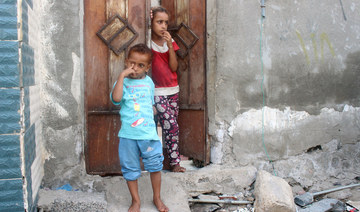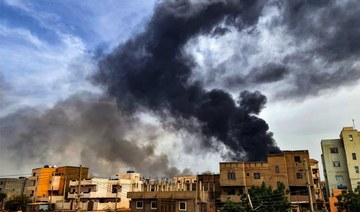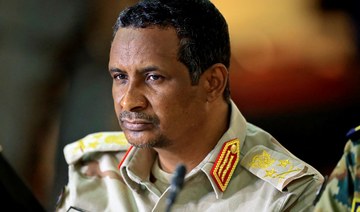GAZA CITY: When Nima Amraa returned to the Gaza Strip from neighboring Egypt earlier this month, she was surprised to learn she was being placed in a makeshift quarantine center set up by the ruling Hamas group.
But her initial jitters turned to fear when two fellow travelers in another facility tested positive for the coronavirus — the first cases to be confirmed in Gaza.
“Once there were cases of the virus spreading, we started to feel afraid and disappointed,” Amraa, a 30-year-old journalist, said by phone from quarantine, where she has spent a week and a half sleeping in a room with five other women and sharing a bathroom.
The virus found a way into Gaza, even though the Mediterranean enclave has been largely cut off from the world by an Israeli-Egyptian blockade since Hamas militants seized it 13 years ago.
On Monday, the Health Ministry said a new case was confirmed among the quarantined, bringing the total to 10. It added all of them were in good condition and receiving care at a special field hospital.
Yet the terrifying possibility of an outbreak in one of the world's most crowded territories — 2 million people squeezed into an area twice the size of Washington, D.C. —does not seem to have registered fully. Many in Gaza seem to accept Hamas assurances that the threat is contained.
In the meantime, Hamas is racing to build two massive quarantine facilities — hoping to prevent the disease from spreading and overwhelming Gaza's already shattered health system.
The construction was ordered after photos surfaced from makeshift centers — mostly schools — showing people celebrating birthday parties with visiting relatives, food being delivered by volunteers and groups of people smoking water pipes together.
Amraa said it was immediately clear that the school where she was placed was not prepared to house so many people.
“I was worried after seeing that we will sleep on mattresses on the floor and we will be six in one room,” she explained. “We eat together and there is no isolation.”
She said she and her roommates take precautions, such as avoiding direct contact and keeping their beds two meters apart from each other. But that might not be enough to keep the virus from spreading. Last week, seven Hamas security guards who were in the facility housing the first two cases became infected themselves.
“We have been very clear on how the quarantine facilities should look like and offer in terms of facilities and services and support,” said Dr. Gerald Rockenschaub, the World Health Organization’s director in the Palestinian territories. “But this is obviously easier said than done in Gaza, where there is substantial shortage in almost everything.”
Although movement in and out of Gaza has been heavily restricted since 2007, it is not cut off altogether. The first two virus cases were men who had returned from a religious conference in Pakistan, part of a wave of hundreds of returnees who were placed into quarantine.
No one knows how much farther the virus has spread. Only 20% of the roughly 1,700 people in quarantine have been tested.
Gaza's people live mainly in densely populated cities and refugee camps. The health care system is in shambles — a result of the blockade, three wars between Hamas and Israel and chronic under-funding due to infighting between Hamas and the rival Palestinian Authority in the West Bank.
Gaza has only 60 breathing machines — and all but 15 are already in use, according to the WHO. The agency has been assisting local health officials and has been working with Israeli authorities, who have no direct contact with Hamas, to import desperately needed equipment and supplies from international donors.
Most people infected by the virus experience only mild symptoms, such as fever and cough, and recover within a few weeks. But the virus can cause severe illness and death, particularly in older patients or those with underlying health problems. High rates of obesity, smoking and stress-related disorders appear to make Gaza’s population especially vulnerable.
Hamas has sought to beef up its quarantine efforts in recent days, opening 18 additional facilities in clinics and hotels and declaring them off-limits. It also has banned weekly street markets and shut down wedding halls, cafes and mosques and extended quarantine periods by a week.
After seeing images of the makeshift facilities, Hamas’ leader in Gaza, Yehiyeh Sinwar, ordered the group’s military wing to build two new quarantine centers.
Situated on the territory’s northern and southern borders, they will be able to hold 1,000 people. The group expects them to be ready within a week.
The public seems to have been calmed by Health Ministry claims that all virus patients are held in quarantine centers. Despite the shutdown orders, people still walk the streets and congregate around small coffee kiosks and noodle shops.
That could change if cases begin to spread.
Last Friday, the crew for a Turkish TV station caused a panic after entering the field hospital where the nine infected people are being treated. The crew subsequently left the facility and broadcast a report the next day. Hamas quickly put the crew members into quarantine and suspended the head of its media office for allowing them access to the facility.
Elsewhere, people still held wedding parties in their homes after wedding halls closed.
Dr. Yahia Abed, an epidemiologist, said the public's apparent lack of commitment to safety precautions is worrisome and that anyone who might have been exposed to the virus must go into full and enforceable isolation.
“If, God forbid, people hid the fact that they had contact with the infected, this will be very dangerous for an area like Gaza. The epidemic will spread,” said Abed, a public health professor at Al-Quds university near Jerusalem.
One factor in the small number of cases so far could be the lack of testing.
COGAT, the Israeli defense body responsible for Palestinian civilian issues, said it has coordinated the delivery of hundreds of coronavirus testing kits by the World Health Organization, as well as protective equipment, medicine and disinfectant.
Israel, along with most Western nations, considers Hamas a terrorist group. But it likely fears the fallout from a catastrophic outbreak would spill over the frontier.
Qatar, which provides extensive humanitarian aid to Gaza, has also stepped in, pledging $150 million in aid and providing furniture, clothes and electrical appliances for the quarantine centers.
The Gaza Health Ministry says it urgently needs more than $20 million to stave off the collapse of the health system if there is a major outbreak.
Rockenschaub said there's still time to improve quarantine procedures in Gaza. “The issue is to move quickly and mobilize support to get them on the way to meet the right international standards,” he said.
Fearing Gaza virus spread, Hamas preps for mass quarantines
https://arab.news/jwsuz
Fearing Gaza virus spread, Hamas preps for mass quarantines
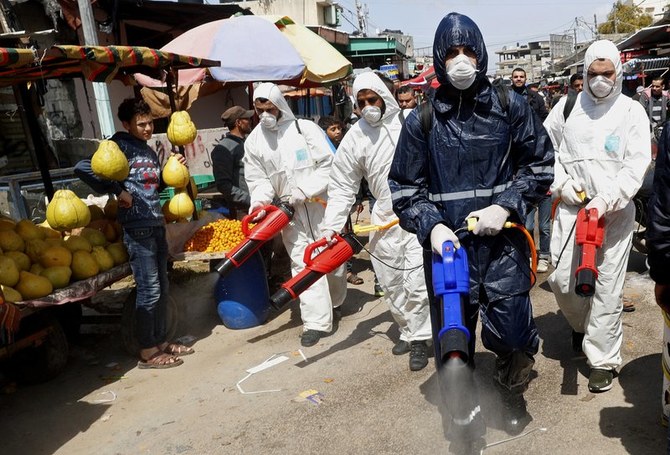
- Gaza Health Ministry says more than $20 million urgently needed to support the shattered health system
- Gaza's people live mainly in densely populated cities and refugee camps
Leaders of Jordan and Pakistan call UAE president to express concern about effects of severe storm

- Leaders passed on their best wishes to the country as it recovers from the storms
DUBAI: The president of the UAE, Sheikh Mohammed bin Zayed Al-Nahyan, received telephone calls from King Abdullah of Jordan and Pakistan’s Prime Minister Shehbaz Sharif on Friday, during which they expressed concern about the effects of the severe weather, including unusually heavy rainfall, that battered parts of the country this week.
They also passed on their best wishes to the country as it recovers from the storms and “conveyed their heartfelt hopes for the safety and prosperity of the UAE and its people, praying for their protection from any harm,” the Emirates News Agency reported.
Sheikh Mohammed thanked both leaders for their warm sentiments, and emphasized the strong bonds between the UAE and their nations.
The UAE and neighboring Oman were hit by unprecedented rainfall and flooding on Tuesday, with more than 250 millimeters of rain falling in parts of the Emirates, considerably more than is normally seen in a year. Dubai International Airport was forced to close temporarily when runways were flooded.
Peshmerga fighter dies in Turkish strike in north Iraq

JEDDAH: A member of the Kurdish Peshmerga security forces was killed on Friday in a Turkish drone strike in the autonomous Kurdistan region of northern Iraq.
Ankara regularly carries out ground and air operations in the region against positions of the outlawed PKK, the Kurdish separatist group that has waged a decades-long insurgency against the Turkish state.
The victim of Friday’s attack died in a drone strike on his vehicle, said Ihsan Chalabi, mayor of the mountainous Sidakan district near Iraq’s borders with Turkiye and Iran.
For decades, Turkiye has operated several dozen military bases in northern Iraq in its war against the PKK, which Ankara and its Western allies consider a terrorist group.
Both Baghdad and the Kurdish regional government have been accused of tolerating Turkiye’s military activities to preserve their close economic ties.
At the beginning of April, a man described as “high-ranking military official” from the PKK was killed in a Turkish drone strike on a car in the mountainous Sinjar region, according to the Kurdistan counterterrorism services.
Turkish President Recep Tayyip Erdogan is expected to visit Baghdad on Monday on his first official visit to Iraq since 2011.
Iraq’s Defense Minister Thabet Al-Abassi in March ruled out joint military operations against the PKK, but said that Turkiye and Iraq would “work to set up a joint intelligence coordination center.”
Middle East in ‘shadow of uncertainty due to regional conflicts’

WASHINGTON: Economies in the Middle East and North Africa face a “shadow of uncertainty” from ongoing tensions in the region, a senior IMF official said.
“We are in a context where the overall outlook is cast into shadows,” Jihad Azour, the International Monetary Fund’s director for the Middle East and Central Asia department, said in an interview in Washington.
“The shadow of uncertainty on the geopolitical side is an important one,” added Azour, a recent candidate for the next Lebanese president.
In the face of the ongoing conflicts in Gaza and Sudan and a recent cut to oil supplies by Gulf countries, the IMF has pared back its growth outlook for the Middle East and North Africa region once again.
FASTFACT
Economic activity in Gaza has ‘come to a standstill’ and the IMF estimates that economic output in the West Bank and Gaza contracted by six percent last year.
The IMF expects growth in MENA of 2.7 percent this year — 0.2 percentage points below its January forecast — before picking up again next year, the IMF said in its regional economic outlook report.
The risks to growth in the MENA region remain heightened, the IMF said, pointing to the danger of greater regional spillovers from the ongoing Israel-Gaza war.
“We have concerns about the immediate and lasting impact of conflict,” Azour said.
The IMF report said that economic activity in Gaza has “come to a standstill” and estimates that economic output in the West Bank and Gaza contracted by 6 percent last year.
The IMF said the report excludes economic projections for the West Bank and Gaza for the next five years “on account of the unusually high degree of uncertainty.”
The IMF cannot lend to the West Bank and Gaza because they are not IMF member countries.
However, Azour said it has provided the Palestinian Authority and the central bank with technical assistance during the current conflict.
“When we move into the reconstruction phase, we will be part of the international community support to the region,” he added.
Azour also discussed the situation in Sudan, where thousands have been killed in a civil war that has also devastated the economy, causing it to contract by almost 20 percent last year, according to the IMF.
“The country is barely functioning, institutions have been dismantled,” he said.
“And for an economy, for a country like Sudan, with all this potential, it’s important to stop the bleeding very quickly and move to a phase of reconstruction,” he added.
The recent Houthi attacks have particularly badly hit the Egyptian economy on Red Sea shipping, which caused trade through the Egypt-run Suez Canal to more than halve — depriving the country of a key source of foreign exchange.
Egypt reached an agreement last month to increase an existing IMF loan package from $3 billion to $8 billion after its central bank hiked interest rates and allowed the pound to plunge by nearly 40 percent.
A key pillar of the current IMF program is the privatization of Egypt’s state-owned enterprises, many of which are owned by or linked to the military.
“This is a priority for Egypt,” Azour said. Egypt needs to have a growing private sector and give space for the private sector to create more jobs.”
“We have an opportunity to re-engineer the state’s role, to give the state more responsibility as an enabler and less as a competitor,” he said.
Oxfam director urges global support for refugees in Jordan
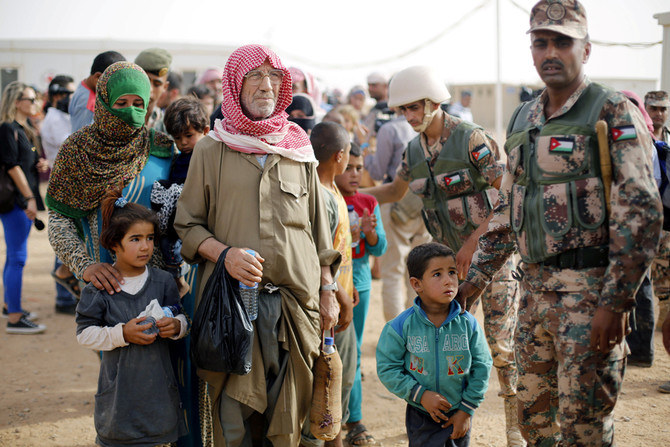
- Dmitry Medlev speaks of impact of over 3m people from neighboring areas
LONDON: Oxfam’s country director in Jordan said on Friday the global community had a responsibility to support refugees, especially in light of unrest in the Middle East.
In an interview with the Jordan News Agency, Dmitry Medlev described how an influx of over 3 million refugees from neighboring areas had stretched Jordan’s economic resources, disrupted local communities, and burdened public services.
He described the refugee’s experience as harrowing, often involving the painful process of abandoning the individual’s homeland and everything they held dear.
He said: “We are sending a message to the world not to overlook the refugee problem and to keep its focus on the new global disasters created by humans or caused by natural disasters, and the conflicts that have emerged in several countries recently, because the refugee problem is draining host countries and imposing additional burdens on them that they may not be able to bear in the future.”
Medlev called for enhanced international cooperation and adherence to international humanitarian law in supporting refugees, underscoring the need for long-term solutions to the ongoing crisis.
He also spoke of Oxfam’s initiatives in Jordan, such as the Waste to Positive Energy project in partnership with the Federal Ministry of Economic Cooperation and Development, and the EU, and executed with the German Corporation for International Cooperation. The project focuses on waste management and recycling in Zaatari Camp and Mafraq Governorate, processing about 30 tonnes of waste per day.
Medlev also pointed out Oxfam’s efforts in promoting economic and climate justice through grants aimed at empowering local projects led by women and youngsters. These grants help enhance project efficiency, ensure sustainability, and connect beneficiaries with supportive institutions.
He outlined Oxfam’s five-year strategy in Jordan, which focuses on gender justice, climate justice, and economic justice, and aims to bolster the country’s preparedness for disasters, enhance employment opportunities, and provide humanitarian support for refugees.
Jordan’s King Abdullah II told the UN General Assembly in September that the world must not abandon Palestinian refugees to the forces of despair.
Sudanese rue shattered dreams as war enters second year
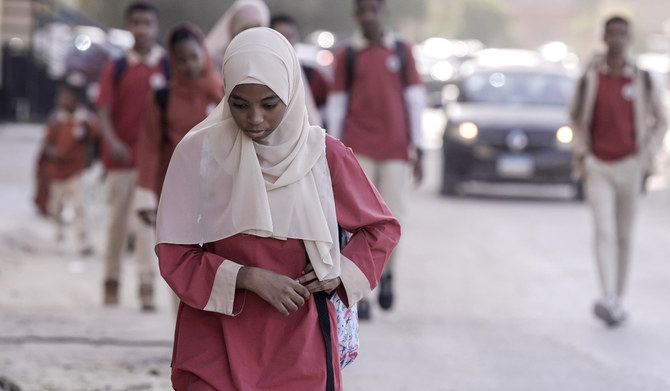
- Bashir’s ouster in April 2019 ushered in a civilian-led transition that saw an outpouring of “hope, inspiration and vibrancy” among young Sudanese, said Samah Salman, who worked in corporate venture capital then
DUBAI: Lawyer Omar Ushari still remembers the hope that gripped Khartoum after the uprising that overthrew President Omar Bashir in 2019. Now, after a year of war between rival generals, much of the Sudanese capital lies in ruins.
The 46-year-old, then detained for his activism, celebrated behind bars when Bashir was toppled in a palace coup.
In the heady days that followed, as the army promised a transition to elective civilian rule, Ushari was released and set to work on his dream project: a literary cafe near the banks of the Nile.
Named Rateena, his cafe swiftly became known as a safe haven for young activists eager to contribute to building a “better Sudan.”
But on April 15 last year, the Sudanese army and the paramilitary Rapid Support Forces went to war, and Ushari watched both his project and his dreams for the country “fade, bit by bit.”
BACKGROUND
Omar Bashir’s ouster in April 2019 ushered in a civilian-led transition that saw an outpouring of ‘hope, inspiration and vibrancy’ among young Sudanese, says Samah Salman, who worked in corporate venture capital then.
For months, he braved raging street battles to visit Rateena, “sit in the dark, take stock of what had been looted since my last visit, and reminisce.”
He did not understand how “the music that filled the space, the lectures and debates people shared, had been replaced with stray bullets strewn around me and the sound of tank fire outside.”
Now, as the war has entered its second year, with thousands dead and millions more driven from their homes, Ushari says he is “only one of the thousands of dreams shattered” — a microcosm of “a stolen revolution.”
Bashir’s ouster in April 2019 ushered in a civilian-led transition that saw an outpouring of “hope, inspiration and vibrancy” among young Sudanese, said Samah Salman, who worked in corporate venture capital then.
Startups were “springing up all across Sudan,” she said from the US, “all building extraordinary solutions to real needs ordinary Sudanese people were facing.”
Salman reviewed over 50 startups in telehealth, agritech, renewable energy, logistics, and fintech solutions, crediting the boom to “the energy of the revolution.”
According to Ushari, “hopes were high that Sudan was finally on the right path, out of the shadows and heading toward democracy, toward freedom.”
Like countless others, communications expert Raghdan Orsud, 36, wanted to play her part.
She co-founded Beam Reports to investigate disinformation in Sudan — “out of the belief in the role media can play in democratic transition,” she said from London.
But that transition ended in October 2021, two months after Beam Reports launched.
The same generals who would later go to war — army chief Gen. Abdel Fattah Al-Burhan and his then-deputy RSF commander Gen. Mohammed Hamdan Dagalo — ousted civilians from the transitional administration.
“Nothing was the same after the coup,” Ushari said.
“It was a painful time. They were killing protesters every week, but still, we had hope.”
Then, one fateful Saturday at the end of Ramadan, the people of Khartoum awoke to the sounds of air strikes and shelling as their worst fears came true: the erstwhile allies had turned their guns on each other.
Bodies began piling up on the streets as vicious urban warfare drove millions to flee.
Orsud had just bought studio-grade recording equipment, “still in their boxes,” when RSF paramilitaries seized and looted her offices.
Ushari was piecing together a life in Cairo when he received a video message showing a massive fire.
“That’s how I found out Rateena had burned down,” he said.
Countless Sudanese in the diaspora — who had spent decades saving up to build their Khartoum homes — have been forced to watch from afar as the RSF looted them.
“At some point, he was praying for an airstrike to hit the house,” pastry chef Shaimaa Adlan, 29, said in Cairo, referring to her father in Saudi Arabia.
“He would have rather seen it destroyed than know his life’s work was being used as a paramilitary base.”
Adlan had started a catering business in Khartoum before finding herself in Egypt — uprooted and jobless.
But barely a year later, she sprints through a bustling kitchen in Cairo, shouting orders to her staff and fussing over dishes.
Back home, Salman says the war has not crushed Sudanese entrepreneurialism, just redirected it.
She said tech entrepreneurs now crowdsource real-time safety updates instead of protest plans and optimize evacuation paths instead of delivery routes.
The same young people organizing demonstrations now coordinate aid, becoming what the UN calls “the front line” of humanitarian response.
And in displacement centers and the diaspora, the dream of a new Sudan has not been forgotten.
“No matter where we’ve been exiled or what remote Sudanese state we’ve ended up in, there’s still a spark of the revolution left in every heart,” Ushari said.
“Sudan is ours, it’s all of ours,” said Orsud, whose fact-checking team has resumed operations from Nairobi.
“What else would we do besides rebuild it, over and over?“









